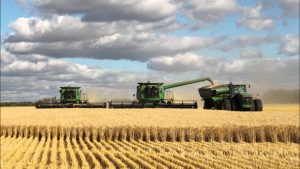Weather-related decision permits trucks hauling ag commodities to exceed gross vehicle weight limits, speed crop transportation
 YORKVILLE (Nov. 5, 2017) — Gov. Bruce Rauner today declared a statewide harvest emergency to assist farmers and grain handlers who are grappling with the fallout of rain-related delays.
YORKVILLE (Nov. 5, 2017) — Gov. Bruce Rauner today declared a statewide harvest emergency to assist farmers and grain handlers who are grappling with the fallout of rain-related delays.
“Illinois is home to 72,000 farms on 26.7 million acres. We are among the top three corn producers in the nation,” Rauner said while visiting Stewart Farms in Yorkville Sunday afternoon. “Moving corn and other crops in a timely and efficient manner affects the bottom line of hard-working farmers. This declaration is an appropriate response to an urgent need.”
Under a new law Rauner signed Aug. 11, the declaration permits drivers of trucks carrying agricultural commodities over state highways to obtain a free permit to exceed gross vehicle weight limits by 10 percent. Further, local authorities may waive the permit requirement at their discretion. The emergency declaration is in effect for 45 days beginning today, Nov. 5.
The Illinois Department of Transportation already is mobilizing the permitting process and notifying law enforcement agencies throughout the state. More information is available at https://truckpermits.dot.illinois.gov/.
“I would like to thank the governor for making this declaration today,” said Richard Guebert Jr., president of the Illinois Farm Bureau. “This harvest season emergency declaration will improve the transportation of our crops.”
According to data from the U.S. Department of Agriculture, the Illinois corn harvest at the end of October was 17 percentage points behind the prior year and 11 percentage points behind the five-year average. The corn harvests in the Northwest, Northeast and East regions are especially hard hit. Harvesters of a variety of crops made up ground toward the end of October, but early delays still are causing backups in the transportation chain.
Jeff Adkisson, executive vice president of the Grain and Feed Association of Illinois, also praised the governor’s action, noting that a bumper crop combined with the harvest delays to compound the situation.
“In years when harvest is better than anticipated, crops like corn and soybeans may need to be stored in piles outside of the traditional concrete or steel bins or tanks,” he said. “This declaration will allow grain elevators to transport commodities out of their facilities quicker, thus making room for grain stored on the ground to be moved to more suitable storage structures.”
Illinois Department of Agriculture Director Raymond Poe said the action will encourage the farming community.
“Illinois farmers work tirelessly year-round, even more so around harvest,” he said. “The Department of Agriculture would like to thank Gov. Rauner for making this declaration and for his support of Illinois farmers.”
And state legislators also welcomed the harvest emergency declaration.
State Rep. Tony McCombie, R-Savanna, co-sponsored HB 2580, which amended the state vehicle code to allow for exceeding trucks’ gross weight limits when a governor declares a harvest emergency.
“Mother Nature has presented Illinois farmers with a rainy spring and fall, making this year’s harvest challenging,” she said. “The State of Illinois was proactive when we foresaw an emergency this year.”
“Farmers form the backbone of our state’s economy,” said state Sen. Neil Anderson, a Republican from Andalusia who sponsored the legislation in the Senate. “Declaring a harvest emergency will reduce red tape and allow those farmers who are still in the field to focus on getting their crops in before winter really takes hold.
“The sooner farmers can get their commodities to market, the more stable the market will be for the consumer.”
State Rep. Dan Swanson, R-Alpha, a member of the House Agriculture and Conservation Committee, said the rainy planting season caused corn and beans to mature later this fall.
“As a result, many farmers are behind in getting their crops harvested,” he said. “With this declaration of a harvest emergency, we will allow farmers the ability to get more grain to the storage sites quicker.”
###
